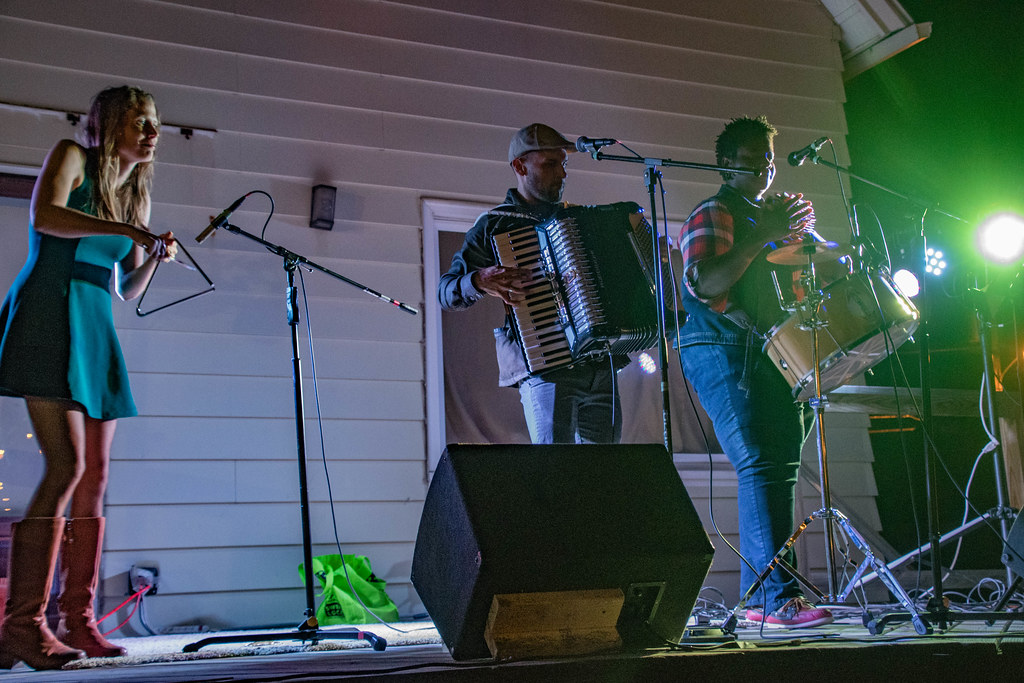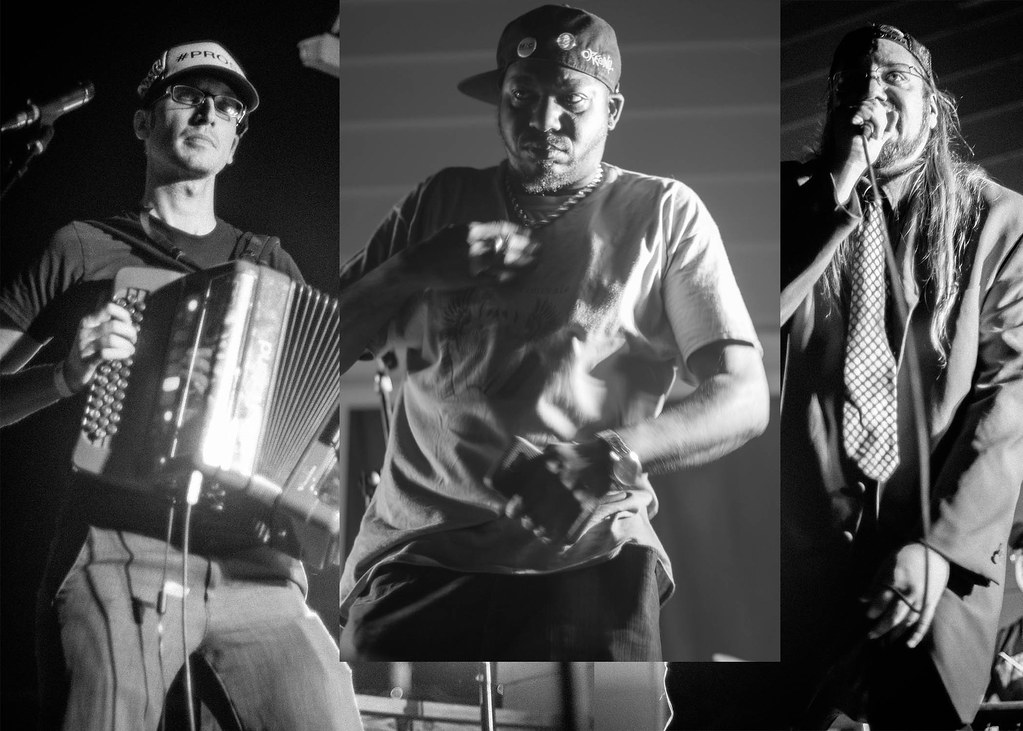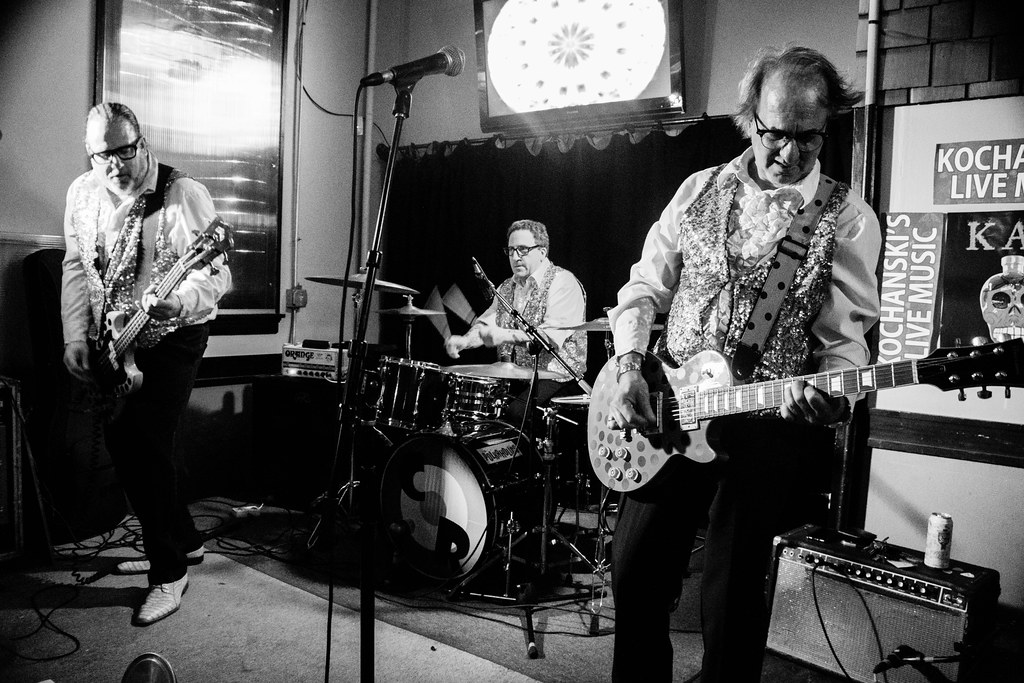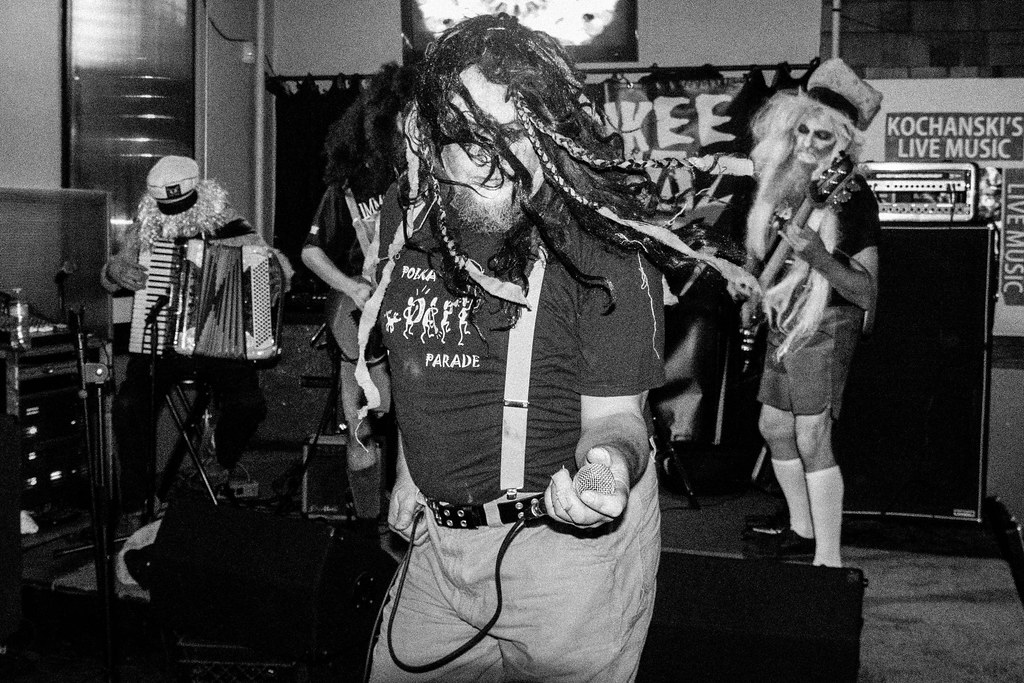About a month ago, I stumbled upon
this essay that basically addressed people who claim "I like all kinds of music, except for rap and country." The essay provoked a lot of conversation, but the essence -- that "learned" people avoid those two genres because they're trying to distance themselves either from "
simple, low class whites" or "thugs" or because they have never lived those lives, or just don't want to live them anymore -- is a valid discussion. I would submit that you could substitute "Polka" (or any kind of music with roots in the common folk) for "country" and you would get a similar reaction.
Which is why, when the Milwaukee Polka Riot at Kochanski's Concertina Beer Hall was announced, I was excited to see it come together, as it did splendidly this past Saturday night. On one hand, many saw it as a crazy fun night, leaning on the novelty aspect of it: a cajun thrash metal band opening and heavy metal polka outfit closing is definitely a novel concept. But "novelty" conjures up the idea that it's a one-joke thing and when it's done, you go back to whatever genre is your favorite and forget about it. The refreshing take that all the bands last night gave was a respect for the Polka genre rather than making fun of it. They simply incorporated polka elements into their own culture, be that ethnic or musical, and thus reinforced the power of "the people's music." When you look at it that way, now mixing Polka with Rap doesn't sound so odd or "novelty."
 |
| Forro Fo Sho |
Which is kind of like Kochanski's itself and its namesake proprietor, Andy Kochanski. Yeah, he's Polish (duh.) Yeah, he knows his Polish brews and has kept a spiritual promise to keep Polka in the place. But remember, this is a guy who twenty years ago hosted a metal video show on MATA Cable Access, and regularly books other bands with roots in working class music: rockabilly, surf, punk, country -- they all have a home here, making it the obvious choice for the inaugural festival of "alternative Polka."
I missed the first act, Preomnor, but arrived in time to catch half the set of Forro Fo Sho, a Forro band out of Madison that nailed the Brazilian genre, at least visually: the Zabumba, the accordion, and the triangle player all locked in step with each other. While it wasn't always a fast two or 6/8 time signature, the music was obviously danceable and the lightness of the instruments suggests an ease of transport. This is people's street music that encourages dancing, or like any blues or folk, singing along. Yes, I looked this up on the internet. Lyrically, Forro songs depict life in NE Brazil, and the natural catastrophes and joys that got with it. And it had that happy beat that gets people dancing accompanied by the often melancholy melody that Polkas have: rhythmically and verbally, this music did indeed belong at this festival.
But it was also during this set that I discovered that there were people who were expecting purists, in a rather ugly way. I was saddened to overhear one couple talking about them: "This isn't polka. If I wanted to hear this shit I'd go to Miami. They should go to Miami and play this." (No, I didn't correct this jerk by informing them that Miami is a few thousand miles from where Forro music is played, I just walked away shaking my head while a companion said, "Oh, she's gonna
just love the November Criminals, then...." But overhearing that conversation saddened me: geez, if we're not willing to listen to each other's music, are we ever going to talk to each other?
 |
| The November Criminals squeeze out the raps |
I didn't give a damn if that jerk liked them. I'd seen the November Criminals once before, and have regretted missing more shows. And last night, they lived up to my memory of them: a weird juxtaposition of two seemingly disparate genres that, three minutes into the set, validated the combination with that same strong, danceable, shakable beat with melancholy melody. Elements of both genres are in every song: the controlled anger, the audience participation, the haunting melodies, the shared joys and fun, but the reminder that we all need to face this together if we're going to survive it. It felt like Coolio had gotten on a time machine and ended up in Warsaw in 1934:
rapping with the locals to a song that sounded like a combination of "Gangsta's Paradise" and some eastern european nazi ghetto residents discussing what to do about the horrible, unacceptable situation over the forlorn accordion. Yet, they take that same sensibility and apply it to what's happening now: In "Roma" they're watching a community going through changes, and the people living there are asking
"does he even speak our language?" November Criminals' very concept shows that we can speak each other's language and in fact, have a musical conversation with it if we're willing to. Yes, they're fun, and they're damn funny, but listen to the raps. These guys are dead serious about dead serious stuff.
 |
| The Polkaholics |
The Polkaholics on one hand, seemed to be the most traditional band of the night: the played polka classics straight up as the danceable songs they always were, albeit with electric guitar, bass and drums and not an squeeze box or clarinet in sight. I guess that's what makes then "punk." That, and that they're as loud and as fast as the most hardcore thrash band. Yet,
their version of "Beer Barrel Polka" sounds just as at home in a punk club as it would during the 7th inning stretch at Miller Park. Their originals are all about the same topics that got covered in the classics: drinking beer, dancing, falling in love, wondering who stole the kishka, and how polka is the best music ("Don't Let Polka Die.") Yet, although they were probably the closest thing to a true polka band musically, even they get grief from purists, being branded at "Polka Enemy #1" (their response: writing a polka about it with that title). Remember, guys, you've played at a bar
whose previous owner, according to onmilwaukee.com was such a purist that you couldn't bring a real accordion in and you'd get kicked out if you called one of the concertinas an accordion. But the Polkaholics bring the unfettered joy of Polka to their act, from their garish sequined-covered costumes, to frontman Don Hedeker's barreling runs into the audience, and I'd want to crash a Polish wedding where they're the band.
 |
| Cheese of the Goat |
And then there's Cheese of the Goat. Lead "singer" (growler) "Gorgon Zola" (
Frank Chandek with a leather goat head) takes the stage ceremoniously and the crack band behind him launches immediately into face melting death metal in syncopated 2/2 time. They do the classics, if "
Who Stole the Kishka" isn't a metal song, I don't know what is. (And yeah,
they do Beer Barrel Polka too.) But their commitment to originals cements their legitimacy as well. When Chandek growls
We! Just! Want! To! Polka! he means it. If anybody questions that this is Polka, if my knees were in better shape, I'd have dragged my polack ass out on the floor and mosh that two-step to prove it. I felt completely at home last night. I'd connected with all my roots: my eastern european Polish/Slav roots, my punk roots, my alternative music roots, my politically revolutionary roots. It was a full night of roots music for me without a bit of country in it. Maybe for next year they could scrape up a country act and really confound that essayist.




Comments